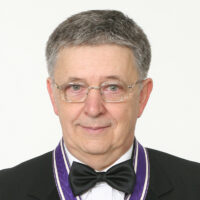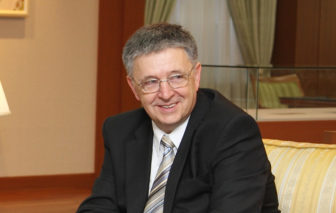
2010 Kyoto Prize Laureates
Mathematical Sciences(including Pure Mathematics)
/ Mathematician
1948 -
Professor, Eötvös Loránd University
A Fledgeling Subject Bridging Classical Theory and New Applications
2010
11 /11 Thu
Place:Kyoto International Conference Center
Mathematical Development of Algorithm Science
2010
11 /12 Fri
13:00 - 17:20
Place:Kyoto International Conference Center
Through his advanced research on discrete structures, Dr. Lovász has provided a link among various branches of mathematics in terms of algorithms, thereby influencing a broad spectrum of the mathematical sciences – including discrete mathematics, combinational optimization and theoretical computer science. In so doing, Dr. Lovász has made outstanding contributions to the advancement of both the academic and technological possibilities of the mathematical sciences.
Dr. László Lovász has made outstanding contributions to the advancement of both the academic and technological possibilities of the mathematical sciences. Through his advanced research on discrete structures he has provided a link among many branches of mathematics in terms of algorithms. Many of his concrete research results are presented in the form of elucidation of the properties of graphs and their algorithmic designs. However, his methodologies go beyond the framework of graph theory to exert significant influence on a broad spectrum of mathematical sciences, including discrete mathematics, combinational optimization and theoretical computer science.
In 1972 Dr. Lovász proved the weak perfect graph conjecture, a well-known open problem in graph theory. This was one of his early representative achievements. The methodology shown in the proof holds high value as a culmination of the paradigm of expressing discrete structures by systems of linear inequalities. In 1979 he succeeded in solving a famous and long-standing open problem on Shannon capacity in the field of information theory. In this work he introduced quadratic forms to express discrete structures. It served as the very first instance of semidefinite programming, which went on to become one of the central topics in mathematical optimization. By further advancing those pioneering achievements he played a role in the development of the geometric methodology of algorithms based on the ellipsoid method, which led to the solution of a major open problem on submodular function minimization. His contributions are significant in clarifying the deeper relationship between computation theory and optimization theory. Through the renowned Lovász local lemma, he provided a fundamental tool of probabilistic methods for the analysis of discrete structures. He also contributed to the creation of a framework for probabilistically checkable proofs, and to the construction of important algorithms such as the matroid matching algorithm and the basis reduction algorithm for integer lattices. The reduction algorithm, commonly known as the LLL algorithm, is one of the basic tools in the theory of cryptography.
Going back and forth between algorithm theory and its peripheral areas in various mathematical topics, Dr. Lovász elucidated the connection and interaction of diverse fields within the mathematical sciences.
For these reasons, the Inamori Foundation is pleased to present the 2010 Kyoto Prize in Basic Sciences to Dr. László Lovász.
Profile is at the time of the award.

Dr. László Lovász Receives the Hungarian Order of Saint Stephen!
On August 20, 2021, Dr. László Lovász, the 2010 Kyoto Prize laureate in Basic Sciences, was awarded the Hungarian Order of Saint Stephen, the highest decoration of Hungary.

Abel Prize for 2021 is Awarded to Dr. László Lovász!
On March 15, 2021, Dr. László Lovász , the 2010 Kyoto Prize laureate in Basic Sciences, was awarded the Abel Prize which recognizes mathematicians with extraordinary achievements. Congratulations on this great honor! The Prize was jointly awarded to Dr. Avi Wigderson. It recognizes “their foundational contributions to theoretical computer science and discrete mathematics, and their...